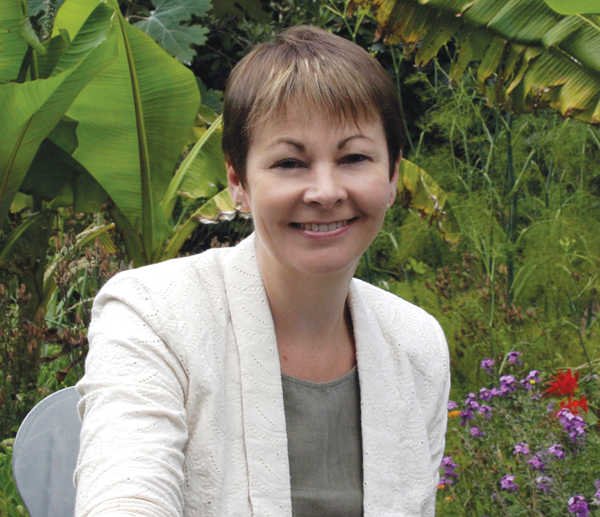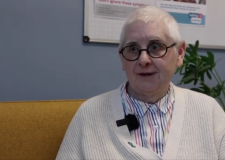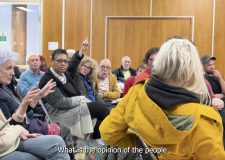No quick fix for Brighton drugs debate
Peter James has helped produce a fresh chapter in the drugs debate as chairman of an independent commission. Frank le Duc reports

The latest work by crime writer Peter James is no bestselling novel. But just like his Roy Grace books, it looks at the dark underbelly of Brighton and Hove. It catalogues the number of drug users, deaths and arrests and shines a light on the work of Sussex Police, the providers of treatment and those trying to educate young people. It contains 20 recommendations in 22 pages.
Publication was marked not with a book launch but a request for people to write the next chapter. Mr James produced his latest work as chairman of the Independent Drugs Commission for Brighton and Hove. The commission was set up nine months ago and spent the autumn listening to various people, many of them experts. The result is a draft report, including the 20 recommendations, and the request for feedback. The details are on the consultation page on the Brighton and Hove City Council website.
The commission estimated that more than 60,000 adults in Brighton and Hove have used illegal drugs. That’s more than a third of the adult population. Of those, about 15,000 people are estimated to have used drugs in the past year and, of those, more than 7,000 in the past month. A study in 2010 identified more than 2,000 problem users of heroin and cocaine. And in the 2011-12 financial year more than 1,400 drug users underwent treatment.
The number of drug deaths appears to be falling, with 50 reported in 2009 and 35 in 2010. Sussex Police made 760 arrests for drug offences in 2011-12. Just over half were for having drugs, about 40 per cent were for supplying or importing drugs and 5 per cent were for production. Some 520 prolific drug users have started structured treatment programmes over the past five years with just under half of them seeing it through. That works out at about one addict a week – or 250 people – turning their back on drugs and the types of crime often linked to drug taking.
The report said: “We heard evidence that a wide range of illegal drugs were easily available to young people.” Encouragingly it added: “It seems that a significant majority of them have never used drugs and most who did use never moved beyond experimental or occasional use.” But it highlighted a core of regular and problematic users.
There is probably a greater need to look at drugs and the law, treatment options and education in Brighton and Hove than in many other places. The commission chaired by Mr James was set up by Safe in the City – the community safety partnership. Its membership includes the council, police, probation service, fire service and health services. Members of the community and voluntary sector also play an important role along with members of the public through local action teams and community forums.
The decision to set up the Independent Drugs Commission was in response to a proposal from Caroline Lucas, the Green MP for Brighton Pavilion. She has been trying to encourage a mature and evidence-based debate about drugs law and policy.
Mike Weatherley, the Conservative MP for Hove, has also been looking at the same subject. He is a member of the All-Party Parliamentary Group for Drug Policy Reform. It recently published a report calling for the reform of Britain’s drug laws and, in particular, better ways to handle the burgeoning supply of legal highs. The debate will continue because, for all their work, one view shared by most is that there is no quick fix.
Brighton & Hove City Council leader Jason Kitcat on fuel poverty
The number of households in Brighton and Hove in ‘fuel poverty’ – where households need to spend more than 10 per cent of their income on keeping their homes warm – is rising. Often this is as a result of poor insulation or outdated heating systems, particularly in our many older buildings. We already run a ‘Your Warm Home’ insulation scheme to help tenants or homeowners from low-income families, who are over 60 years old, or who have a disability or long-term health conditions.
The government recently launched a ‘Green Deal’ scheme to allow households to upgrade their home energy efficiency with little or no upfront costs. The expense of improvements such as roof insulation and new boilers will be paid over time from the savings made on householders’ energy bills. While a step in the right direction, the government’s Green Deal is not as ambitious or accessible as it should have been. Nevertheless we’ll be working with West Sussex County Council and others to look at ways we can help make the Green Deal work best for our residents. The government can do so much more to eliminate poorly-insulated houses, cut our carbon footprint and create jobs.
For example the national campaign coalition, Energy Bill Revolution, is calling on government to use the money raised from carbon taxes to invest in a nationwide programme to ensure all of our homes need far less energy to keep warm. This could insulate over half a million homes each year and create 130,000 jobs.
While we continue to campaign for stronger alternatives, we’ll be working hard to help residents cut their bills and reduce the cost of living at a time when energy prices continue to rise.



















